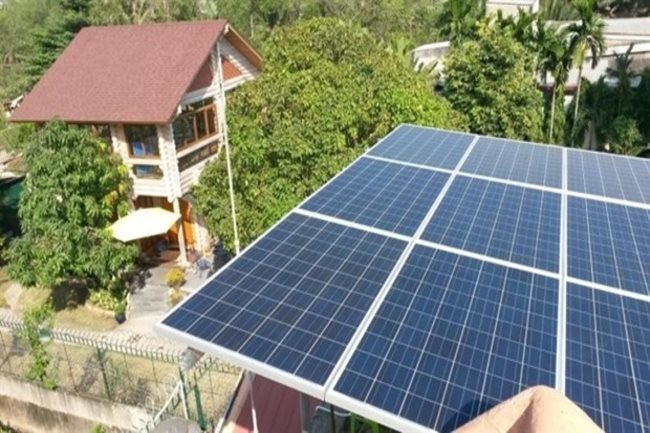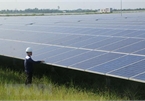 |
|
Solar panels installed on rooftops in HCMC. Policy and regulatory actions are needed to move toward a more financially, socially and environmentally sustainable energy future – PHOTO: VES
|
The VBF Power and Energy Working Group held a press conference in Hanoi to release the second version of the Made in Vietnam Energy Plan (MVEP 2.0).
VBF co-chairwoman Virginia Foote was quoted by the local media as saying the plan was rolled out in the context that the development of renewable, clean and safe energy is an urgent issue as the country is approaching the complete exhaustion of fossil fuel resources.
Citing data from the Ministry of Industry and Trade, the report pointed out that more than 330 solar power projects with a total registered generation capacity of 26,000 megawatts (MW) were in various stages of approval and addition to the country’s power development plan in January 2019.
Among them, 121 projects, with a total generation capacity of 6,100 MW, had already been approved and added to national and provincial plans.
Among these, one large private investment project in the south-central coastal province of Ninh Thuan, with a cluster of three facilities and a capacity of 330 MW, was connected to the national grid in April 2019.
This plant is the largest solar power facility in Southeast Asia, with a total of more than one million panels and total investment of more than VND7 trillion, currently valued at more than US$300 million. The plant contributes to reducing nearly 304,400 tons of carbon dioxide emissions per year.
Vietnam holds great potential for the development of clean power, such as solar power, wind power and hydropower, according to John Rockhold, head of the Power and Energy Working Group.
The country’s demand for power is increasing, and the system of transmission lines should be completed as soon as possible, he remarked.
He noted that State resources are limited, so it is vital to promote private-public partnerships and encourage the participation of the private sector in power management, distribution and pricing.
MVEP 2.0 proposed several business-oriented recommendations that would improve the reliability and affordability of Vietnam’s energy system.
The first recommendation is to prioritize renewable energy in the national power plan. There are alternative scenarios where renewable energy, excluding hydropower, could account for up to 30% of capacity by 2030.
These alternative scenarios require regulatory support and incentives to leverage private sector investment. Engaging the private sector, with its experience in market analysis, finance and consumers’ needs, would increase the effectiveness of the planning process, according to the report.
The report recommended tax leveling for the development of certified domestic offshore gas and the import of LNG as the current best-fit baseload for renewable energy.
“Under the current tax regime, the development of offshore gas fields in Vietnam can either provide significant revenues for the government through taxes and royalties or, if taxes and royalties are reduced, more affordable energy for consumers,” said the report.
Other recommendations included constructing a regulatory and permissive environment that attracts private sector investment for clean energy generation and energy efficiency and investing in grid infrastructure to improve stability and capacity as well as halting any new approvals for coal.
The report stressed that regulatory frameworks and incentives should be put in place to encourage investment in renewable energy, such as rooftop or floating solar energy, battery storage and offshore wind projects, with simplified approval processes, while still maintaining safe power systems. SGT

Challenges hinder development of renewable energy
Renewable energy has emerged as one of the most preferred sectors for investment in Vietnam,but the development of such projects has been hampered by a number of challenges, according to a survey by Grant Thornton,

Developing renewable energy in Vietnam: Through the lens of equality and sustainability
While Vietnam is facing many challenges in producing electricity, renewable energy is emerging as the tipping point for advancing development that is inclusive and sustainable in the country.
 An energy strategy that focuses on renewables, natural gas, energy efficiency and battery storage will attract private sector investment, the Vietnam Business Forum (VBF) said in a report.
An energy strategy that focuses on renewables, natural gas, energy efficiency and battery storage will attract private sector investment, the Vietnam Business Forum (VBF) said in a report.